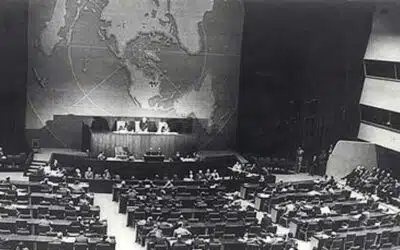The U.S. is pressuring the Palestinians to surrender to the demand to recognize Israel as a “Jewish State” — which would effectively mean acquiescing to the fifth of the population of Israel that is Arab being relegated to second-class citizenry, accepting that the Zionists’ unilateral declaration of the existence of the state of Israel and ethnic cleansing of Palestine were legitimate, and surrendering the internationally recognized right of Palestinian refugees to return to their homeland.
The Israeli daily Haaretz reported last month that “the Americans are pressuring the Palestinians to accept the Israeli demand and agree to its inclusion in the framework agreement U.S. Secretary of State John Kerry is formulating.” Last week, Haaretz reported that Kerry was asking Saudi Arabia and Jordan to use their influence to get the Palestinians to accept this demand, or at least not to interfere with the U.S.-led so-called “peace process” — which is the process by which the U.S. and Israel have long blocked implementation of the two-state solution, in favor of which there is a strong international consensus.
Such reports should not come as a surprise; it has long been evident that the U.S. had accepted the position of the government of Israeli Prime Minister Benjamin Netanyahu that the Palestinians must accept Israel as a “Jewish State”. President Barack Obama said as much last month at the Saban Forum when he said that “the outlines of a potential agreement” were well known, two states and making “state of Israel as a Jewish state secure” (emphasis added).
John Kerry, speaking at the same forum, similarly stated that the growth in the population of Palestinians was an “existential threat” to Israel, “a demographic time bomb” that would make it “impossible for Israel to preserve its future as a democratic, Jewish state without resolving the Israeli-Palestinian conflict in a two-state solution. He repeated that the U.S. goal was to “establish an independent, viable Palestinian state, and achieve recognition of Israel as the homeland of the Jewish people” (emphasis added).
But this U.S. policy of accepting Netanyahu’s position is not a recent development. This has been U.S. policy for over four years. I discuss this in my forthcoming book on the U.S. role in the Israeli-Palestinian conflict. Following is an excerpt from Chapter 6:
On September 23, 2009, Obama told the Assembly that the U.S. had “worked steadily and aggressively to advance the cause of two states”. He then elucidated on how it would continue doing so, repeating the formula that the U.S. “does not accept the legitimacy of continued Israeli settlements” while refusing to acknowledge their illegality and calling for “negotiations without preconditions”. He said that the U.S. goal was to have two states: “a Jewish state of Israel” alongside a “viable and independent Palestinian state”. He thus implicitly endorsed Netanyahu’s demand that the Palestinians recognize Israel as a “Jewish state”. Furthermore, he said the establishment of the Palestinian state would be a step towards ending “the occupation that began in 1967”, another reiteration of the U.S.’s acceptance of Israel’s unilateral interpretation of Resolution 242. With no lack of irony, Obama added that the world “must decide whether we are serious about peace, or whether we will only lend it lip service.”
An illustration of where his own administration stood with regard to that question came the following day during a meeting between Mitchell’s team and Palestinian negotiators. The chief P.A. negotiator, Dr. Saeb Erekat, said that any exclusion of East Jerusalem from a settlement “freeze” was “a non-starter” and asked, “When the U.S. president says settlements are ‘illegitimate’, what are the consequences of that? Will anything change?”
David Hale, a member of the U.S. team, replied that that “from the beginning” the U.S. had “treated Jerusalem and settlements as separate issues”.
The only meaningful interpretation of Hale’s statement is that the U.S. in practice supported Israel’s illegal annexation and colonization of East Jerusalem. Hale proceeded to express how he understood that the Palestinians were “unhappy” that any settlement freeze would have “imperfections”, but that they “just won’t get” what they wanted. In other words, Israel’s illegal colonization in East Jerusalem would continue, with the U.S.’s blessing. Making plain that the U.S. position going into any negotiations was tantamount to Israel’s, Hale added that currently existing construction projects would also not be part of any such freeze.
When Jonathan Schwartz on the U.S. team asked the Palestinians if they would be willing to accept Obama’s remarks to the U.N. as terms of reference for negotiations, they responded as one: “No”, said Erekat. “He said ‘the Jewish state’”, interjected Akram Haniyeh. “Which is indirectly taking a position on refugees,” finished Rami Dajani. That is, to recognize Israel as a “Jewish state” would not only be to accept the consignment of the fifth of Israel’s population that is Arab to second-class citizenship, but also to effectively surrender the internationally recognized right of return of Palestinian refugees to their homeland, since this right threatened Israel’s existence as demographically “Jewish”.
“That’s our position”, Mitchell’s team insisted, confirming that Obama had indeed intended his description of Israel as “a Jewish state” to signal that the U.S. stood fully behind Netanyahu’s demand that the Palestinians surrender the right of return.
To keep updated about the book and to gain access to more sneak peeks, subscribe to my free newsletter.


